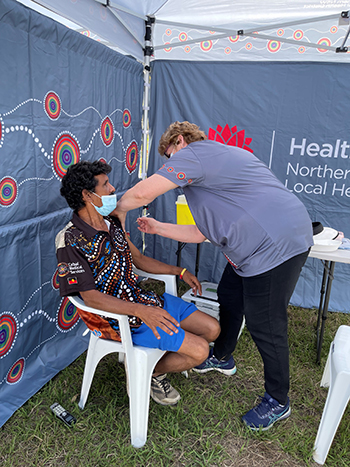
Partnering vital for boosting Aboriginal vaccination rates
As Australia moves towards a high percentage of adults being fully vaccinated for COVID-19 the vaccination rates for Aboriginal and Torres Strait Islander people, the most vulnerable population, still has some ground to cover.
The disappointingly low COVID-19 vaccination rates cannot be attributed to one single cause. Undoubtedly, the roll out of, and access to, the preferred vaccine, this being Pfizer, is one factor. Vaccination hesitancy, fuelled by widespread misinformation and hearsay, is another. Additionally, some communities of faith have perceived contradictions between their beliefs and the health advice.
In Northern NSW, Bulgarr Ngaru Medical Aboriginal Corporation (BNMAC), estimates the total eligible Aboriginal population for COVID-19 vaccination to number 4,500 adults but by mid-August 2021 only nine per cent of this population had received the first vaccination dose and seven per cent were double vaccinated.
However, a vaccination drive and the increased availability of the Pfizer vaccine nearly doubled this figure within the next fortnight, resulting in some 16 per cent receiving a first dose and 15 per cent being fully vaccinated.
This surge in vaccination uptake coincided with the spread of the Coronavirus in the Aboriginal populations of Wilcannia and Walgett – living proof of the devastation that the virus could cause. The first, unfortunate Aboriginal death in Dubbo, of an individual who was not vaccinated, was a wakeup call for many.
- Details
- Written by: Scott Monaghan
Read more: Partnering vital for boosting Aboriginal vaccination rates
Eat Mediterranean, hold the chemicals
An international study conducted in Crete, Greece has found that moving from a Western diet to a non-organic Mediterranean diet based on a high intake of fruit and vegetables can result in insecticide and organophosphate levels three-times the normal level.
Even more alarming was the finding that a Mediterranean diet made from conventionally farmed food results in a ten times higher pesticide intake than a Mediterranean diet made entirely from organic produce.
The international research team included Southern Cross University’s Professor Carlo Leifert, the foundation Director of SCU’s Centre for Organics Research. Co-authors came from a range of institutions and the study was published in The American Journal for Clinical Nutrition.
The study, Diet and food type affect urinary pesticide residue excretion profiles in healthy individuals: results of a randomized controlled dietary intervention trial, compared the effect of a healthy Mediterranean type diet with a habitual Western diet, as well as the effect of conventionally produced foods with organic food on intake of pesticides, a group of environmental pollutants with known negative health effects.
- Details
SCU graduate has lead role in Sydney coastal art walk
Proud Yaegl woman and Southern Cross University (SCU) alumna, Frances Belle Parker has been selected to ground Aboriginal art and stories along the spectacular Northern Beaches coastline walk.
Spanning 36km of coastline between Manly and Palm Beach, the Northern Beaches Coast Walk is a continuous path that passes beachfronts, spectacular headlands, residential communities and coastal villages. The Aboriginal Art & Storytelling Project is the first major commission for the Coast Walk Public Art Program.
‘This is an amazing opportunity to be able to create public artwork that tells a deeper part of the coastline’s story,’ Frances said.
‘Through engagement with the Northern Beaches’ Aboriginal community, I hope we can tell stories that are relevant as well as convey the underlying messages of the country and the people who walked this land before us.
‘I plan to explore the themes of middens and the whale songlines through the artwork. I’ll also be using some elements of my cousin’s work, the late Jessica Birk, who lived on the Northern Beaches and loved everything about it. In a sense the work becomes a tribute to the amazing artist she was.’
- Details
Read more: SCU graduate has lead role in Sydney coastal art walk

After the pandemic, virtual healthcare is the future
The COVID-19 pandemic has shifted perceptions of the health system. With virtual healthcare, some acute conditions can be treated at home.
This article by Martin Bowles, former Northern Rivers Area Health Service CEO and former Secretary of the Commonwealth Department of Health first appeared in John Menadue’s Pearls and Irritations in September 2021.
I have long believed we need to see a shift from our fixation on beds in hospitals. We have seen successive governments focus on beds as a proxy for the healthcare system.
We have also had a very structured view on how we pay for healthcare. We have a transactional approach to care. While this is fine for my broken leg or a simple viral infection (not COVID-19, of course) it is not appropriate for someoneThe COVID-19 pandemic has shifted perceptions of the health system. With virtual healthcare, some acute conditions can be treated at home.
with a long term chronic condition. Where we need multidisciplinary care, we need a different payment structure to support that care.
- Details
- Written by: Martin Bowles
Read more: After the pandemic, virtual healthcare is the future
Compressing morbidity improves late-life quality
In one of the most famous lines in American literature – uttered by Nick Romano in Willard Motley’s long-forgotten novel Knock on any Door – the advice is to “Live fast, die young, and leave a good-looking corpse.”
A number of rock singers and others have heeded this advice, although the state of their corpses has often fallen short of the mark.
In the opposite corner stands Rheumatologist and Stanford University Professor Dr James Fries who more than 40 years ago coined the term ‘compression of morbidity’, meaning to minimise the duration of chronic disease suffering before death, the aim being to improve the quality of our older years. For budget watchers such as politicians this wise advice also relates strongly to the subject of health costs.
Although compression of morbidity has now become a key goal of healthy ageing and longevity it may be easier to express than to achieve, unless appropriate strategies are put into place.
- Details
- Written by: Andrew Binns
Page 27 of 177















